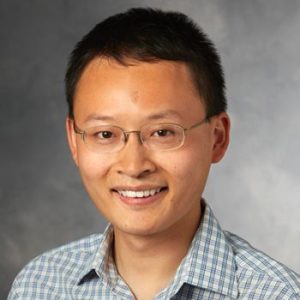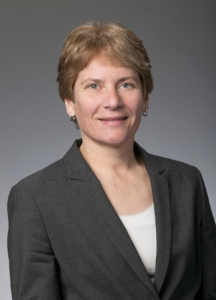
“A Distributionally Robust Optimization Method for Adversarial Multiple Kernel Learning with Application to the Semantic Hashing of CT Images”
Masoud Badiei Khuzani, PhD
“Prediction of Clinical Outcomes in Diffuse Large B-Cell Lymphoma (DLBCL) Utilizing Radiomic Features Derived from Pretreatment Positron Emission Tomography (PET) Scan”
Eduardo Somoza, MD

Radiology Department-Wide Research Meeting
• Curt Langlotz, MD, PhD: Overview of the AIMI Center
• Brian Hargreaves, PhD: Research Details from Town Hall, Q&A, and COVID19 Updates
Location: Zoom – Details can be found here: https://radresearch.stanford.edu
Meetings will be the 3rd Friday of each month.
Hosted by: Brian Hargreaves, PhD
Sponsored by: the the Department of Radiology

CEDSS: Systematic identification of fluid-based biomarkers for ovarian and prostate cancer
Thomas Kislinger, Ph.D.
Professor & Chair
Department of Medical Biophysics
University of Toronto
Senior Scientist
Princess Margaret Cancer Centre
Zoom Webinar Details
Meeting URL: https://stanford.zoom.us/s/94878578384
Dial: +1 650 724 9799 or +1 833 302 1536
Webinar ID: 948 7857 8384
Passcode: 692692
Register Here
ABOUT
Thomas Kislinger received his MSc in Analytical Chemistry from the University of Munich, Germany (1998). He completed his PhD in 2001, investigating the role of Advanced Glycation Endproducts in diabetic vascular complications at the University of Erlangen, Germany and Columbia University, New York. Between 2002 and 2006 he completed a post-doctoral fellowship at the University of Toronto. In 2006 he joined the Princess Margaret Cancer Centre as an independent investigator. Dr. Kislinger holds positions as Senior Scientist at the Princess Margaret Cancer Centre and as Professor and Chair at the University of Toronto in the Department of Medical Biophysics. The Kislinger lab applies proteomics technologies to translational and basic cancer biology. This includes the development of novel proteomics methodologies, identification of liquid biopsy signatures and the molecular identification of novel cell surface markers.
Hosted by: Utkan Demirci, Ph.D.
Sponsored by: The Canary Center & the Department of Radiology
Stanford University – School of Medicine

Intersection of Imaging and Therapeutics – MIPS Mini-Retreat
Hosted by: Dr. Heike Daldrup-Link, MD & Dr. Katherine Ferrara, PhD
Sponsored by: Department of Radiology, Molecular Imaging Program at Stanford
The MIPS Mini-retreat series brings together members of the MIPS and greater School of Medicine community to discuss current opportunities for research and collaborations. Each month we will discuss a different topic and we invite all those interested to attend. The mini-retreats will be roughly 1.5-2 hours in length with ample time for discussion throughout. We hope you can join us and spark new collaborations!
Zoom Webinar Information
Webinar URL: https://stanford.zoom.us/j/96227145646
Dial: US: +1 650 724 9799 or +1 833 302 1536 (Toll Free)
Webinar ID: 962 2714 5646
Passcode: 3039816
Agenda (all times are in PST)
8:00-8:05 AM – Opening Remarks – Katherine Ferrara, PhD
8:05-8:20 AM – Image-guided Therapy – Heike Daldrup-Link, MD
8:20-8:35 AM – Imaging Antibody Distribution – Eben Rosenthal, MD
8:35-8:50 AM – MRgFUS and Pancreatic Cancer – Pejman Ghanouni, MD, PhD
8:50-9:05 AM – RefleXion – Lucas Kas Vitzhum, MD
9:05-10:00 AM – Discussion – Moderated by: Katherine Ferrara, PhD

James Zou, PhD
Assistant Professor of Biomedical Data Science and, by courtesy, of Computer Science and of Electrical Engineering
Stanford University
Title: Computer Vision to Phenotype Human Diseases Across Physiological and Molecular Scales.
Abstract: I will present new computer vision algorithms to learn complex morphologies and phenotypes that are important for human diseases. I will illustrate this approach with examples that capture physical scales from macro to micro: 1) video-based AI to assess heart function (Ouyang et al Nature 2020), 2) generating spatial transcriptomics from histology images (He et al Nature BME 2020), 3) and learning morphodynamics of immune cells. Throughout the talk I’ll illustrate new design principles/tools for human-compatible and robust AI that we developed to enable these technologies (Ghorbani et al. NeurIPS 2020, Abid et al. Nature MI 2020).
Bio: James Zou is an assistant professor of biomedical data science and, by courtesy, of CS and EE at Stanford University. He is also a Chan-Zuckerberg investigator. James develops novel machine learning algorithms that have strong statistical guarantees and that are motivated by human health challenges. Several of his methods are widely used by tech, biotech and pharma companies. He also works on questions important for the broader impacts of AI—fairness, accountability, interpretations, and robustness. He has received 5 best paper awards at top CS venues, a NSF CAREER Award, a Google Faculty Award, and a Tencent AI award.

MIPS Seminar Series: Translational Opportunities in Glycoscience
Carolyn Bertozzi, PhD
Director, ChEM-H
Anne T. and Robert M. Bass Professor in the School of Humanities and Sciences
Professor, by courtesy, of Chemical and Systems Biology
Stanford University
Location: Zoom
Webinar URL: . https://stanford.zoom.us/j/94010708043
Dial: US: +1 650 724 9799 or +1 833 302 1536 (Toll Free)
Webinar ID: 940 1070 8043
Passcode: 659236
12:00pm – 12:45pm Seminar & Discussion
RSVP Here
ABSTRACT
Cell surface glycans constitute a rich biomolecular dataset that drives both normal and pathological processes. Their “readers” are glycan-binding receptors that can engage in cell-cell interactions and cell signaling. Our research focuses on mechanistic studies of glycan/receptor biology and applications of this knowledge to new therapeutic strategies. Our recent efforts center on pathogenic glycans in the tumor microenvironment and new therapeutic modalities based on the concept of targeted degradation.
ABOUT
Carolyn Bertozzi is the Baker Family Director of Stanford ChEM-H and the Anne T. and Robert M. Bass Professor of Humanities and Sciences in the Department of Chemistry at Stanford University. She is also an Investigator of the Howard Hughes Medical Institute. Her research focuses on profiling changes in cell surface glycosylation associated with cancer, inflammation and infection, and exploiting this information for development of diagnostic and therapeutic approaches, most recently in the area of immuno-oncology. She is an elected member of the National Academy of Medicine, the National Academy of Sciences, and the American Academy of Arts and Sciences. She also has been awarded the Lemelson-MIT Prize, a MacArthur Foundation Fellowship, the Chemistry for the Future Solvay Prize, among many others.
Hosted by: Katherine Ferrara, PhD
Sponsored by: Molecular Imaging Program at Stanford & the Department of Radiology

PHIND Seminar Series: Maternal Trauma History, Attachment Style, and Depression Are Associated with Broad DNA Methylation Signatures in Infants
Thalia Robakis, M.D., Ph.D.
Associate Professor
Department of Psychiatry
Mount Sinai School of Medicine
Location: Zoom
Webinar URL: https://stanford.zoom.us/s/95483174518
Dial: US: +1 650 724 9799 or +1 833 302 1536 (Toll Free)
Webinar ID: 954 8317 4518
Passcode: 179384
11:00am – 12:00pm Seminar & Discussion
RSVP Here
ABSTRACT
Background: The early environment provides many cues to young organisms that guide their development as they mature. Maternal personality and behavior are an important aspect of the environment of the developing human infant. The molecular mechanisms by which these influences are exerted are not well understood. We attempted to identify whether maternal traits could be associated with alterations in DNA methylation patterns in infants.
Methods: 32 women oversampled for history of depression were recruited in pregnancy and provided information on depressive symptoms, attachment style, and history of early life adversity. Buccal cell DNA was obtained from their infants at six months of age for a large-scale analysis of methylation patterns across 5×106 individual CpG dinucleotides, using clustering-based criteria for significance to control for multiple comparisons. Separately, associations between maternal depression, attachment style, and history of adversity and psychobehavioral outcomes in preschool-age children were examined.
Results: Tens of thousands of individual infant CpGs were alternatively methylated in association with each of the three studied maternal traits. Genes implicated in cell-cell communication, developmental patterning, growth, immune function/inflammatory response, and neurotransmission were identified. The result sets were highly coextensive among the three maternal traits, but areas of divergence exhibited intriguing parallels with behavioral outcomes.
Conclusions: Maternal personality traits are an important aspect of the infant environment that shapes offspring development in many ways. Infant genes that are epigenetically modified in reponse to maternal traits are potential candidate mediators for these effects. We have identified a large number of such genes and demonstrated parallels to clinically measurable outcomes in children.
ABOUT
Dr. Robakis is a psychiatrist with clinical and research interests in perinatal mood disorders and in the contribution of early life experiences to adult mental health and illness. She completed her M.D. as well as a Ph.D. in developmental neurobiology at Columbia University’s Medical Scientist Training Program, residency training in psychiatry at Stanford University School of Medicine, and a research fellowship in perinatal mood disorders also at Stanford. She remained on the clinical faculty at Stanford until 2019, when she accepted a position at the Icahn School of Medicine at Mount Sinai, where she is currently Associate Clinical Professor of Psychiatry and Assistant Director of the Women’s Mental Health Program.
Dr. Robakis’ research interests include the effects of early life stress and disordered attachment on risk for psychiatric illness in the perinatal period, on alterations in metabolism and cognition, and on psychobehavioral development in offspring. She is particularly interested in using epigenetic marks to help identify the biological pathways through which early life experiences exert their effects on outcomes in adulthood and intergenerationally.
Hosted by: Garry Gold, M.D.
Sponsored by the PHIND Center and the Department of Radiology

Imaging Immune Cell Modulation – MIPS Mini-Retreat
Hosted by: Dr. Katherine Ferrara, PhD
Sponsored by: Department of Radiology, Molecular Imaging Program at Stanford
The MIPS Mini-retreat series brings together members of the MIPS and greater School of Medicine community to discuss current opportunities for research and collaborations. Each month we will discuss a different topic and we invite all those interested to attend. The mini-retreats will be roughly 1.5-2 hours in length with ample time for discussion throughout. We hope you can join us and spark new collaborations!
Zoom Webinar Information
Webinar URL: https://stanford.zoom.us/j/94969801773
Dial: US: +1 650 724 9799 or +1 833 302 1536 (Toll Free)
Webinar ID: 949 6980 1773
Passcode: 292995
Agenda (all times are in PST)
8:00-8:05 AM – Opening Remarks – Katherine Ferrara, PhD
8:05-8:25 AM – Imaging CAR-T cells – Clinical Need – Crystal Mackall, MD
8:25-8:45 AM – Imaging Immune Cells in Cancer – Clinical Need – Ronald Levy, MD
8:45-9:05 AM – Imaging Approaches – Anna Wu, PhD
9:05-10:00 AM – Discussion – Moderated by: Katherine Ferrara, PhD

Amber Simpson, PhD
Canada Research Chair in Biomedical Computing and Informatics
Associate Professor in the School of Computing
and Department of Biomedical and Molecular Sciences
Queen’s University
Title:
Solving Fundamental Cancer Problems with Artificial Intelligence
Abstract:
Precision medicine is an approach to patient care that considers individual differences in a patient’s genetic and molecular makeup to predict disease progression and optimize treatment response – and one of the greatest opportunities, and challenges, in modern cancer care. There is currently no known method to predict the metastatic potential of any cancer at early stages. We propose to address this critical barrier by creating a cancer digital twin, a digital replica of a cancer patient using state-of-the-art artificial intelligence (AI) techniques applied to 900,000 abdominal CT scans from a high-volume cancer center. Predicting metastatic progression at early stages would radically transform our approach to cancer treatment, but promises substantial implications for patients and society that must be considered. For example, would you want to know a dismal prognosis predicted by your digital twin? How would you act on this information – would you regard the choice as yours, or your fate as given by your twin? In a world where AI is increasingly biased, how do we ensure that AI doesn’t create further inequities? Dr. Simpson will present new work on the development of a cancer twin for predicting metastatic progression as well as provide some discussion of the social ramifications of such technology.
Bio: Amber Simpson is the Canada Research Chair in Biomedical Computing and Informatics, and Associate Professor jointly appointed in the Department of Biomedical and Molecular Sciences and School of Computing at Queen’s University. She is an Affiliate of the Vector Institute for AI as well as a Senior Investigator at the Canadian Cancer Trials Group. She received her PhD in Computer Science from Queen’s and was a postdoctoral fellow in the Department of Biomedical Engineering at Vanderbilt University. Recently recruited from a faculty position at Memorial Sloan Kettering Cancer Center in New York, she holds research funding from the National Institutes of Health as well funding from all three Canadian research councils (Social Sciences and Humanities Research Council of Canada, Natural Sciences and Engineering Research Council of Canada, and Canadian Institutes of Health Research). Dr. Simpson is an American Association of Cancer Research and Pancreatic Cancer Action Network award holder and a charter member of NIH study section, which recognizes her innovations in biomedical research. Dr. Simpson is the new director of the Human Mobility Research Centre, a centre that will be expanded to focus on health data innovations.

Radiology Department-Wide Research Meeting
Location: Zoom – Details can be found here: https://radresearch.stanford.edu
Meetings will be the 3rd Friday of each month.
February 19 Speakers:
Bruce Daniel, MD – Center Overview: IMMERS
Jennifer McNab, PhD – Encoding and Decoding Diffusion MRI
Hosted by: Brian Hargreaves, PhD
Sponsored by: the the Department of Radiology